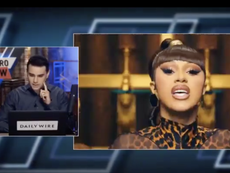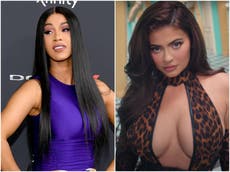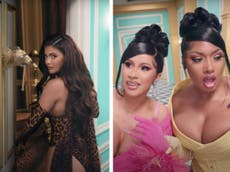Is it really fair to punish Kylie Jenner for her cameo in Cardi B and Megan Thee Stallion's WAP music video?
As petty and arguably mean-spirited the effort to erase Jenner has become however, I completely understand where it’s coming from

When Cardi B and Megan Thee Stallion’s hit single WAP landed last Friday, it was with (pun fully intended) a giant splash.
Awash with huge fountains in the shape of large breasts, explicit double entendres and nods to the infamous Lil Kim squat, the video, predictably, has embroiled the internet in fierce debates for days now.
There was the expected discussion about whether the overt display of sexuality went too far; what the sexually charged video meant for “the children”, and, bizarrely, from right-wing US commentator, Ben Shapiro, whether WAP was a step backwards for feminism.
But perhaps the most interesting part of the debate thus far has come from the biggest fans of the video themselves. At the centre of that controversy? None other than Kylie Jenner, whose cameo in WAP has come under fierce criticism, with a Change.org petition to remove her from the music video reaching over 67,000 signatures since launching last week.
As petty and arguably mean-spirited the effort to erase Jenner has become however, I completely understand where it’s coming from.
I’m no fan of the Kardashian-Jenners. I say that not as a reality television snob (E! We TV and Bravo have all collectively helped to get me through lockdown thus far) but as someone who has long been sick of the family’s overbearing presence in pop and black culture in particular.
It’s an issue even Kris Jenner, the matriarch of the family-cum-franchise, has admitted to in the past. Telling People in 2017, that “We are kind of everywhere, so there is a possibility that there is an oversaturation.”
I’d wager that that possibility is now a reality. Thirteen years after the debut of Keeping Up With The Kardashians, it seems people have had enough. And in the context of WAP, I see why.
Titillation aside, the union of two of the biggest names in hip hop is a large part of what drove so much excitement ever since Cardi B and Megan teased the arrival of the project this time last week.
Here were two black women supporting each other at the top of their game, one having just recovered from multiple gunshot wounds (and a plea for people to take black women seriously when the internet turned her pain into a meme), the other a former sex-worker/internet star, who unexpectedly rose to fame with a surprising smash-hit debut album in 2018.
It’s a collaboration that many have framed as a continuation of the push for a new wave of black female solidarity not seen in hip hop in the mainstream since the 90s and 00s. People want to see black women shine in the music industry. Kylie Jenner, herself no stranger to accusations of cultural appropriation, does not fit in with that fantasy.
She has been accused of blackfishing (the concerning trend in which people don black or “ethnically ambiguous” features and styling to appear anything other than what they are – white); she’s faced allegations of lifting work from black designers for her own brand; she’s been said to have lifted her style directly from black American culture, profiting so much from black beauty practices and trends that she was declared the world’s youngest self-made billionaire (until Forbes dethroned her earlier this year).
For anyone who agrees with that assessment of the star (and indeed most of her siblings) seeing her pop up in that music video, walking towards a door in slow motion and, er, opening it, would have been jarring, to say the least.
Is it necessarily because she’s white? I wouldn’t say so. Other notable cameos in the video include Rosalia, a white Spanish artist (who has also been accused of appropriation in the past). I haven’t seen complaints about her inclusion to nearly the same degree as Jenner. And of the remaining cameos (all black and black mixed-race women), including Normani, former Fifth Harmony member and rising star; Sukihana an up and coming rapper and internet personality; Rubi Rose, an influencer and rapper; and Mulatto a rapper and winner of reality series The Rap Game; pretty much everyone has some kind of connection to music. In other words, their cameos make sense.
Cardi B has since responded to the backlash against the reality star, taking to Twitter to explain that she included her because, among other things, “She treated my sister and daughter so lovely at her kid’s bday party”, and has family ties to Jenner’s partner, Travis Scott, as well as Kris Jenner herself.
“It was so important to me to include different women that are different races and come from different backgrounds but are so powerful and influential”, she added.
Despite Cardi’s slightly clumsy assertion that “not everything is about race” in relation to Jenner aside – seriously, with that family when is it not about race? – Jenner’s inclusion makes perfect sense.
Us normies like to believe that the celebrities we root for are similarly aligned in who they themselves root against. And we like it even more when those figures we abhor are kept worlds apart from those we admire. But as eye-roll inducing it is to see this extremely tanned, sculpted and perpetually coiffed family pop up like whack-a-moles in everything, we’re forgetting something. These people, no matter how much we like them, or see them as down to earth, all run in the same circles as those we don’t. They may not make their living from crafting and promoting every inch of their lives in the exact same ways, but they have much more in common with each other than you or I. And crucially, they likely recognise the pull of being connected to anything related to the Kardashian-Jenners in the first place.
As Indy100 editor Sirena Bergman pointed out to me this week, the collaboration is almost reminiscent of the initial popularity of Taylor Swift’s painstakingly-curated girl squad. It makes perfect business sense to surround yourself with other successful women in entertainment. The only problem, as the demise of Swift’s girl squad showed, is that as people tire of the Kardashian-Jenners, Cardi B’s revamped version would arguably feel more authentic without Kylie.





Join our commenting forum
Join thought-provoking conversations, follow other Independent readers and see their replies